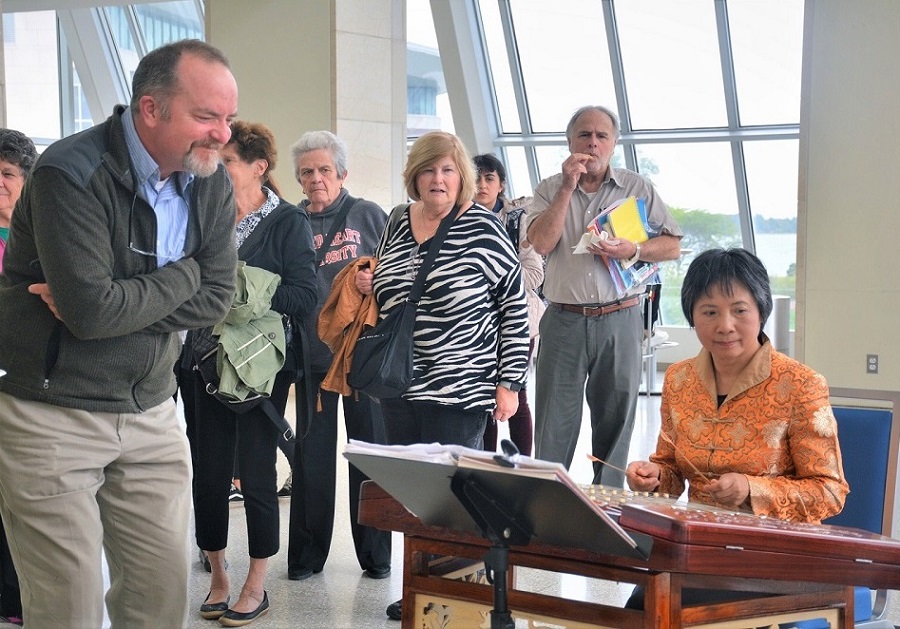By Xinming Li, bostonese.com
Boston, Jan. 22, 2019, — As the Spring semester starts for local colleges this week, UMass Boston has closed its Confucius Institute, which boasts of a history of 12 years. The news resonated strongly on campus and in the community. Professors, staff, students and members of the community expressed deep regret over the university’s action and some called that the closure of the Confucius Institutes was a sign of “political correctness”.

Picture from 2018 Mid-Autumn Festival celebration at UMass Boson.
As learnt from the official website of UMass Boston, the Confucius Institute, founded in 2006, has been holding various cultural activities and Chinese language teacher training programs all year round, playing a positive role in the understanding of Chinese culture on campus and in the community.
Since 2007, the “China Today” program has provided opportunities for nearly 300 students from UMass Boston to study in China. Meanwhile, more than 200 middle school students have participated in the “Chinese bridge” China trip summer camp. Nearly 30 college students has visited China as the Ambassadors of the Confucius Institute. With the closure of the Confucius Institute, the students will lose such opportunities.
Made significant contributions in Chinese language teaching
The Confucius Institute has hosted the “Chinese bridge” Chinese speech contest for middle school students for more than ten times and for college students in New England for eight times. Being regarded as the most influential and authoritative in the United States and hailed by teachers as the “cradle of future diplomats” and the “ladder of future ambassadors to China,” the contests each year attracted nearly one thousand students across America, including those from Harvard University and MIT,to sign up and participate in. With the closure of the Confucius Institute, the contests will come to an end on campus.
The traditional Chinese New Year and Mid-Autumn festival celebrations, once a bright spot on campus, may disappear in the future.
The Confucius institute of the university of Massachusetts Boston is the only designated test site for YCT and HSK in Massachusetts. About hundreds of people take the exams every year and its order-and-delivery exam services are particularly popular with the local schools.
From November 2017 to April 2018, the Confucius Institute, together with the Confucianism Association at Boston University, jointly planned and held a series of lectures on “Confucianism in the era of globalization in the 21st century”. The special topics included Confucianism and Education, Confucianism and Religion, Confucianism and Management, etc., which gained wide attention in Boston area. With the closure of the Confucius Institute, these activities will disappear from campus.
The Confucius Institute constantly provided its eight Confucius Classrooms with support for their cultural activities, including books and supplies. The closure of the Confucius institute will have a certain impact on the students of these schools.
Established in 2006, the Confucius Institute at UMass Boston is the first Confucius Institute in New England. Its contribution to the campus and community is commendable and the closure of the Confucius Institute is a regret and a loss for the campus and the community.
Exploring new ways of learning Chinese language and culture
Katherine Newman, the Interim Chancellor at UMass Boston, declined to give a specific reason for the decision. She only expressed that as the concerns about the Confucius Institute have been raised across the country, UMass Boston began several rounds of consultations with Renmin University of China over the past months, actively seeking new ways for the two universities to work together to promote Chinese language teaching, Chinese culture and history, which may be more effective in promoting mutual understanding between China and the United States.
It is reported that 12 American universities have announced the closure of Confucius institutes, including the University of Chicago, Pennsylvania State University, the University of Michigan, the University of Rhode Island, Texas A&M and so on. Hanban’s official website says the Confucius Institutes are a form of Chinese culture going global, and its fate is now being challenged in the United States. The closure of several Confucius Institutes has raised questions about how to make Chinese culture take root in foreign countries.